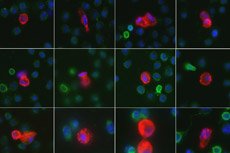Home » Translational Research » Research Highlights » Here
In this section
Heart Disease
 Scripps Translational Science Institute (STSI) researchers are investigating circulating endothelial cells as a potential biomarker of increased risk for sudden heart attack. And, in a “gene desert” region on human chromosome 9, STSI researchers are taking advantage of the relatively new research tool, zinc finger nucleases, and other groundbreaking new approaches, such as induced pluripotent stem cells, to identify DNA variants that increase risk for coronary artery disease. Recently completed studies include investigations of cardiovascular pharmacogenomics as well as the genomics of predicting a child’s risk for developing cardiovascular disease as an adult.
Scripps Translational Science Institute (STSI) researchers are investigating circulating endothelial cells as a potential biomarker of increased risk for sudden heart attack. And, in a “gene desert” region on human chromosome 9, STSI researchers are taking advantage of the relatively new research tool, zinc finger nucleases, and other groundbreaking new approaches, such as induced pluripotent stem cells, to identify DNA variants that increase risk for coronary artery disease. Recently completed studies include investigations of cardiovascular pharmacogenomics as well as the genomics of predicting a child’s risk for developing cardiovascular disease as an adult.

Cardiovascular pharmacogenomics
Genotype testing enables cardiologists to identify and to prescribe alternative anti-platelet treatments for patients who have a CYP2C19 variant that impairs clopidogrel metabolism.

Circulating endothelial cells:
potential prognostic biomarker for sudden heart attack
If blood levels of circulating endothelial cells are a prognostic biomarker for an impending heart attack or stroke, physicians could more accurately gauge patients’ risk for these life-threatening conditions and initiate therapies to prevent their occurrence, or at least lessen their severity.

Bogalusa Heart Study
Do genetic variations in a child’s DNA help predict cardiovascular disease in adult years? STSI researchers recently completed a study that identified time-dependent variants that influence cardiovascular disease trait values over time.
